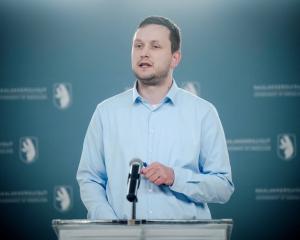
Although Taiwan has had just 1290 cases, most of them imported from abroad, among a population of about 24 million, a recent small rise in community transmissions has spooked residents used to life carrying on as normal, despite the global pandemic.
Though the government has not yet raised the alert level, which could cause the closure of shops selling non-essential items and severely limit gatherings, other curbs are being stepped up, especially in Taipei, the capital.
Late on Friday, several universities, including the elite National Taiwan University, said they would immediately switch to remote learning, telling students to stay away from campuses.
"As Covid-19 is still wreaking havoc, please be reminded to wear a mask at all times when you go out, wash hands frequently, and keep appropriate social distancing," National Taiwan University said in a statement.
The Taipei Fine Arts Museum, where people have queued for a hugely popular exhibition by Japanese artist Shiota Chiharu opened this month, said it would close from Saturday to comply with the city's prevention rules.
"The re-opening date will be announced according to the epidemic situation and city regulations," it said.
Taipei's National Palace Museum, home to one of the world's best and most extensive collections of Chinese art, said it too would close from Saturday.
The current cluster of infections has centred on the north and Taipei, but cases have also cropped up elsewhere, such as the major southern port city of Kaohsiung.
Its mayor, Chen Chi-mai, said authorities would disinfect wide range of public spaces, including the night markets that are usually a big draw for hungry tourists.













